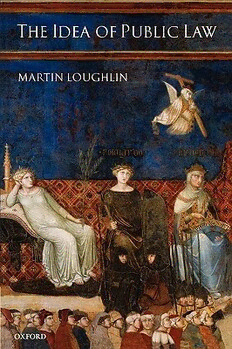Table Of ContentTHE IDEA OF PUBLIC LAW
THE IDEA OF
PUBLICLA W
MARTIN LOUGHLIN
Professor of Public Law
London School of Economics & Political Science
OXFORD
UNIVERSITY PRESS
OXFORD
VNIVBJlSITY PUSS
Great Clarendon Street, Oxford OX2 6DP
Oxford University Press is a department of the University of Oxford.
It furthers the University's objective of excellence in research, scholarship,
and education by publishing worldwide in
Oxford New York
Auckland Bangkok Buenos Aires Cape Town Chennai
Dar cs Salaam Delhi Hong Kong Istanbul Karachi Kolkata
Kuala Lumpur Madrid Melbourne Mexico City Mumbai Nairobi
Sao Paulo Shanghai Taipei Tokyo Toronto
Oxford is a registered trade mark of Oxford U nivcrsity Press
in the UK and in ccnain other countries
Published in the United States
by Oxford University Press Inc., New York
© M. Loughlin, 2003
The moral rights of the author have been ases ned
Database right Oxford University Press (maker)
First published 2003
Published in paperback 2004
Crown copyright material is reproduced under Class Licence
Number COIPOOOOI48 with the permission of the Controller of
HMSO and the Queen's Printer for Scotland
All rights reserved. No part of this publication may be reproduced,
stored in a retrieval system, or uansmitted, in any form or by any means,
without the prior permission in writing of Oxford University Press,
or as expressly permitted by law, or under terms agrcdc with the appropriate
rcprographics rights organization. Enquiries concerning reproduction
outside the scope of the above should be sent to the Rights Department,
Oxford U nivcrsity Press, at the address above
You must not circulate this book in any other binding or cover
and you must impose this same condition on any acquircr
British Library Cataloguing in Publication Data
Data available
Library of Congress Cataloging in Publication Data
Data available
ISBN 978-0-19-926723-1 (hbk.)
ISBN 978-0-19-927472-7 (pbk.)
5 7 9 IO 8 6
Typeset by Hope Services (Abingdon) Ltd.
Printed in Great Britain
For Chris
Preface
This book is the product of an extended period of research and reflection on the foun
dations of a subject I am employed to profess. For this opportunity I am greatly
indebted to two institutions: the Leverhulme Trust, which generously awarded me a
Major Research Fellowship enabling me to devote two years {2000-02) entirely to
the study; and the London School of Economics & Political Science, which, when
appointing me to the chair of public law from September 2000, willingly granted me
leave for the purpose of taking up the Leverhulme Fellowship.
My main objective has been to uncover the foundations of public law, especially as
the subject has evolved in Britain. In carrying through what is largely a historical
investigation, I concluded that since much of what passes for received wisdom in the
field was unfounded, I needed to develop a clearer account of the nature of the dis
cipline than I had previously been able to offer. I tried to resolve this by sketching the
conceptual foundations of public law as part of the larger, more historically orien
tated, study, but this proved unwieldy. I have therefore effected a partial separation
between the conceptual and historical, and in this book present an outline of the
conceptual aspects of the subject.
This division has not been without its difficulties, not least because of this exercise
of theorizing--of moving towards the unconditional engagement of understanding.
To move from the practical (what is the time?) to the philosophical (what is time?) is
a journey that most of us trained as lawyers are singularly unsuited to travel. Why
might we be encouraged to go beyond the practical world of decision and judgment
and treat such judgments as contingent verdicts that invite further interrogation? The
best answer I can offer is that in doing so we arrive at a more satisfactory account of
much of what is merely implicit in our experience of government. And I am there
fore mindful of the fact that a large part of that question remains to be answered. At
best, this account of the idea of public law can be considered only to be a contingently
acceptable formulation. But here I gather reasus rance from Oakeshott's observation
that the irony of all theorizing lies in 'its propensity to generate, not an understand
ing, but a not-yet-understood'.
In addition to the two institutions mentioned above, I have greatly benefited from
invitations to talk about many of the issues in the book at the Universities of
Aberdeen, Cambridge, Glasgow, Nottingham, Southampton and Victoria (British
Columbia); the Queen's University, Kingston, Ontario and the European University
Institute in Florence; and at seminars on 'Constitutionalism and Governance in
Transition' in Belfast, on 'America and the Enlightenment: Constitutionalism in the
21st Century' in London, and 'Theory and International Law' in Oxford. In relation
to these occasions I should like to thank all the participants, and especially John
McLaren, Stephen Tierney, James Tully, Mark Walters, and Neil Walker. I must also
thank Jean Lee, who did a fine job locating and retrieving texts for me, and the
V111 Preface
following for reading and commenting on various drafts: Margit Cohn, Neil
Duxbury, Elizabeth Frazer, Nicola Lacey, James Penner, Thomas Poole, and Adam
Tomkins. Finally, I am again much indebted to Chris Foley for her editorial work in
helping to make it all a little more readable.
ML
Dobcross
May2003
Acknowledgements
Chapt3e, r4 sa nd5 draown t hfoel lowipnrgev ioupsulbyl isphaepde rs:
'ConstituLatwi:To hneaT lh irOdr deorft heP olitini calN'i choBlaasm foratnhd
Peter Leyland (eds), Law in a Multi-layered Constitution (Oxford:H an, 2003),
1-25.
'RepresentatainodCn o nstituThteoiryo'n ailn P auClr aiagn dR ichaRawrldi ngs
(eds), Law and.Administration in Europe(OxfoOrxfdo:r Udn iversPi�t.y 2 003),
47-66.
'TeTne netso fS overeiignNn etilyW 'al ker( ed.)So,verei gn#] in Transition (Oxford:
Han, 2003), 55-86.

